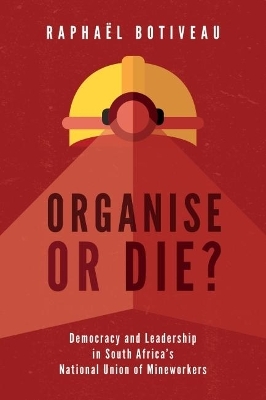
Organise or Die?
Wits University Press (Verlag)
978-1-77614-204-0 (ISBN)
Organise or Die? Democracy and Leadership in South Africa’s National Union of Mineworkers is the first in-depth study of one of the leading trade unions in the country. Founded in 1982, the trade union played a key role in the struggle against white minority rule, before turning into a central protagonist of the ruling Tripartite Alliance after apartheid. Deftly navigating through workerist, social movement and political terrains that shape the South African labour landscape, this book sheds light on the path that led to the unprecedented 2012 Marikana massacre, the dissolution of the Congress of South African Trade Unions (Cosatu) federation and to fractures within the African National Congress (ANC) itself.
Working with the notions of organisational agency and strategic bureaucratisation, Raphaël Botiveau shows how the founding leadership of NUM built their union’s structures with a view to mirror those of the multinational mining companies NUM faced. Good leadership proved key to the union’s success in recruiting and uniting mineworkers and NUM became an impressive school for union and political cadres, producing a number of South Africa’s top post-apartheid leaders. An incisive analysis of leadership styles and strategies shows how the fragile balance between an increasingly distant leadership and an increasingly militant membership gradually broke down.
Botiveau provides a compelling narrative of NUM’s powerful history and the legacy of its leadership. It will appeal to a broad readership – including journalists, students and social sciences scholars – interested in South Africa’s contemporary politics and labour history.
Trained in the social sciences (political sociology, African and postcolonial studies) in four countries (France, South Africa, the United States and Italy), Raphaël Botiveau first worked as a journalist before devoting himself to research and teaching. He received his PhD from the Université Paris 1 Panthéon-Sorbonne (France) and La Sapienza Università di Roma (Italy) focusing on trade unionism and negotiation in South Africa’s post-apartheid gold and platinum mining industries.
Figures And Tables
Acknowledgements
Acronyms And Abbreviations
Chapter 1 Introduction: South African Trade Unions in Apartheid and Democracy
Part I Organisational Agency In Union Bureaucracy And Politics
Chapter 2 Local Weaknesses Solved through Centralisation
Chapter 3 The Power of Head Office: Building National Bureaucracy
Chapter 4 Doing Union Politics: The Branches as Idealised Seat of Union Power
Chapter 5 The Regions as Antechambers of National Power
Part II Leading Mineworkers: A Charterist Leadership School
Chapter 6 The Burden of Leadership
Chapter 7 The Learning Organisation
Chapter 8 Trajectories of Union Leaders and NUM Leadership Ideals
Chapter 9 Taking Control of NUM: The Rise of the Communist Faction
Chapter 10 Conclusion: From Bureaucratic Organisation to Bureaucratic Politics
Index
| Erscheinungsdatum | 08.01.2018 |
|---|---|
| Zusatzinfo | 39 Illustrations |
| Verlagsort | Johannesburg |
| Sprache | englisch |
| Maße | 156 x 234 mm |
| Themenwelt | Geisteswissenschaften ► Geschichte ► Regional- / Ländergeschichte |
| Sozialwissenschaften ► Politik / Verwaltung | |
| Technik ► Bergbau | |
| Wirtschaft ► Volkswirtschaftslehre ► Makroökonomie | |
| ISBN-10 | 1-77614-204-7 / 1776142047 |
| ISBN-13 | 978-1-77614-204-0 / 9781776142040 |
| Zustand | Neuware |
| Haben Sie eine Frage zum Produkt? |
aus dem Bereich


